The Independent's journalism is supported by our readers. When you purchase through links on our site, we may earn commission.
How to do Christmas like a pro: 32 chefs share their top tips for a seamless celebration
’Tis the season for... stressing about Christmas dinner. From prepping now to planning for leftovers, 32 chefs share their top tips for staying cool and feasting well. Hannah Twiggs writes

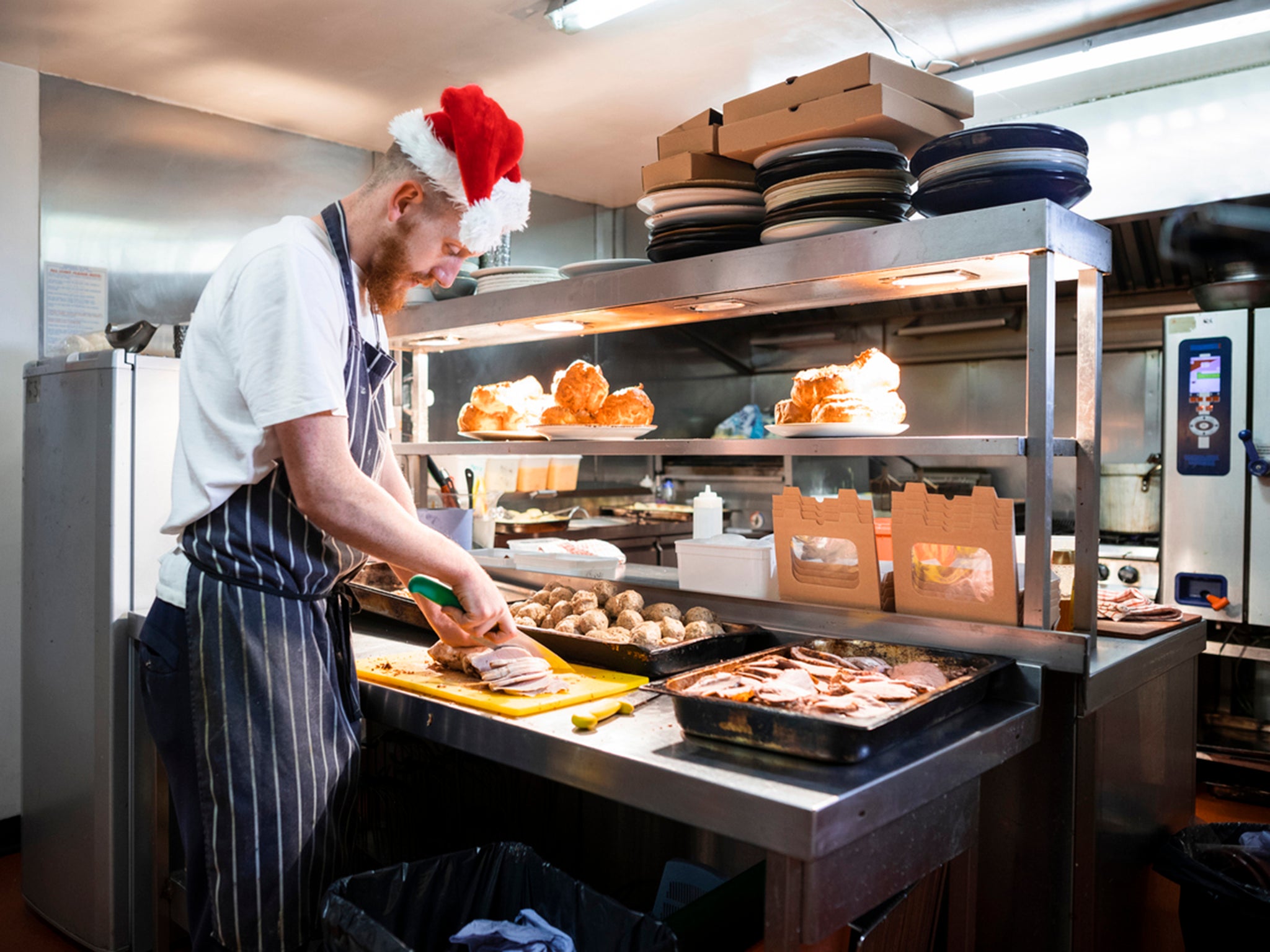
Your support helps us to tell the story
From reproductive rights to climate change to Big Tech, The Independent is on the ground when the story is developing. Whether it's investigating the financials of Elon Musk's pro-Trump PAC or producing our latest documentary, 'The A Word', which shines a light on the American women fighting for reproductive rights, we know how important it is to parse out the facts from the messaging.
At such a critical moment in US history, we need reporters on the ground. Your donation allows us to keep sending journalists to speak to both sides of the story.
The Independent is trusted by Americans across the entire political spectrum. And unlike many other quality news outlets, we choose not to lock Americans out of our reporting and analysis with paywalls. We believe quality journalism should be available to everyone, paid for by those who can afford it.
Your support makes all the difference.As the holiday crescendo approaches, we asked 32 tops chefs to unveil their secrets to pulling off a seamless and delectable Christmas celebration.
From Thomas Piat’s meticulous approach to sauce preparation for the perfect Christmas Davy gravy and Tommy Banks’ savvy advice on hassle-free dinners, to Peter Sanchez-Iglesias praising Heston Blumenthal’s shop-bought Christmas puddings and Joel Breakwell lifting the curtain on his speciality veggie stock, the expertise is as varied as the chefs themselves.
Whether you’re seeking the perfect roast turkey, innovative starters or imaginative ways to revamp leftovers, this compilation should serve as your culinary compass.
Prep to get ahead
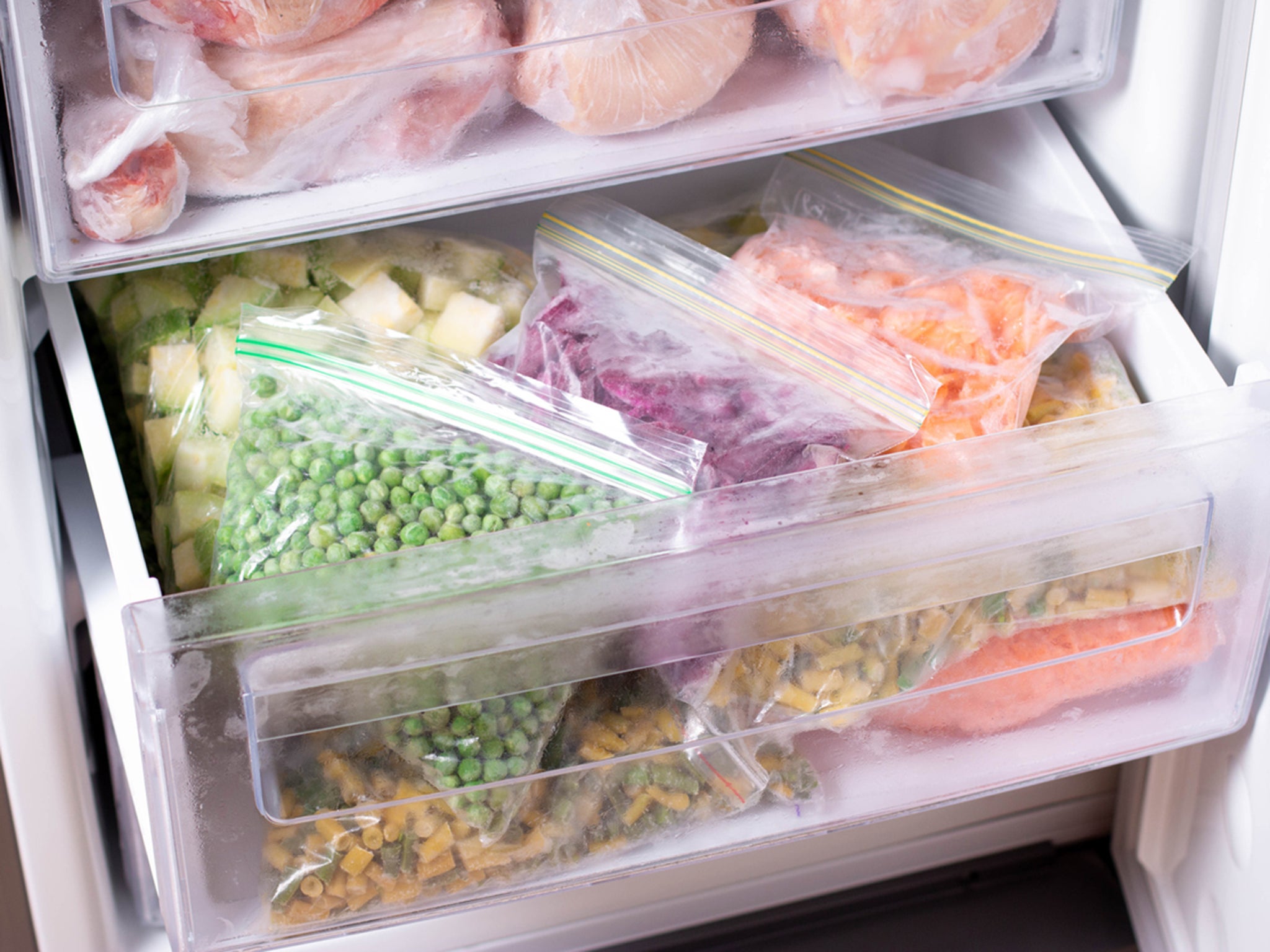
Thomas Piat, executive chef at Searcys, London
“Sauces are the most important thing to prep ahead of Christmas Day. Traditional gravy, when done properly, can take a few days to prep, from boiling the bones to adding the vegetables and filtrating it all. You can also brine the chicken in advance to enhance moistness and flavour. I like to use a mix of spices and honey for a golden and crispy skin result.”
Tommy Banks, chef and owner of The Black Swan, Roots and The Abbey Inn, York
“To ensure a hassle-free Christmas dinner, Banks recommends getting as much preparation done in advance as possible. Try, for example, prepping your roast potatoes in the lead up to Christmas: “Boil your potatoes and dip them in duck fat.” Then all you need to do is roast them in the oven on the big day!”
Will Bowlby, co-founder and head chef at Kricket, London
“Save time in the kitchen this Christmas by preparing as much as you can ahead of the big day. My Christmas pudding kulfi is not just delicious; it can also be made in advance and stored in the freezer. Plus, it’s a fantastic way to repurpose leftover Christmas pudding in those days between Christmas and New Year. The process is simple: reduce milk, milk powder and cream in a pan until it reduces by half and starts to caramelise. Then fold through crumbled Christmas pudding. Finally, take off the heat to cool and freeze into moulds. It’s that simple! Want to make life even easier? Use tinned condensed milk to save time and stirring.”
Peter Sanchez-Iglesias, chef-owner of Casa and Paco Tapas, Bristol
“I’m a massive fan of Heston Blumenthal’s Christmas puddings from Waitrose. Why make your own when they’re as good as his?”
Lloyd Morse, chef-owner of The Palmerston, Edinburgh
“I always freeze stewed onions cooked in chicken stock for boulangère potatoes. I normally spend Christmas Eve drinking whisky in the conservatory with my father-in-law, so I’ll drunkenly try and remember to take it out of the freezer before I go to bed. Then on Christmas Day you just have to slice some potatoes, mix it all together and stick it in the oven.”
James Knappett, chef-founder of Kitchen Table, London
“Pre-batched negronis, made festive with the addition of sloe or damson, are a great thing to keep in the freezer during Christmas. It’s the perfect thing to serve friends and family after a cold winter walk – and prepping them in this way means that everyone can enjoy their drink at the same time, rather than waiting for each one to be made individually. I also like to freeze sausage rolls as an easy canapé for Christmas parties. You can prep a whole tray of them before freezing them raw – ready to bring out for a crowd-pleaser on short notice. Finally, I like to freeze a strudel for dessert – wrapping seasonal fruits like pears and apples in shop-bought pastry, which can go straight from the freezer to the oven when needed.”
Alex Brownrigg, head chef at Casa, Bristol
“I take a lot of tips from my mum, who has Christmas down to a fine art. She always peels, cuts and parboils her roasties in November, then freezes them – all you need to do on the day is preheat your oven to 180C, get your fat (preferably duck or goose) nice and hot, toss the frozen potatoes in it and let them roast for 45 minutes to an hour. Also, for mince pies, frozen puff pastry is realistically as good as you can make it at home these days, so you can absolutely save time by not making it yourself and the mincemeat keeps really well made in advance thanks to sugar content. You can also go a step further – if you have the freezer space, make up a whole tray of mince pies and freeze it, then all you have to do is put it straight into the hot oven (180C-190C) for 25 minutes or until golden brown.”
Fionnan Flood, head chef of The Chelsea Pig, London
“I would suggest freezing down bulk jobs like braised red cabbage, stuffing mix for turkey and cranberry puree. These will all keep well in the freezer, and you could even freeze down your gravy (using veal or chicken bones from your local butcher). Freezing apples (I recommend Granny Smith) to be then grated on a fine microplane creates a sort of apple snow which is a delicious addition to dessert (winter spiced custard) – it’s even nice with a cheeseboard.”
Emily Cuddeford, founder of Twelve Triangles, Edinburgh
“I make chicken stock with bones or carcasses, reduce it down and stash it in the freezer and then it’s ready to add to the pan juices to make your Christmas Day gravy. I also keep some croissants in the freezer to take out and pop in the oven on Christmas morning so they are freshly baked, and you get that wonderful croissant smell wafting through your house.”
Joel Breakwell, executive chef of Casa and Paco Tapas, Bristol
“My specialty is veggie stock, which I prep in advance during the Christmas run-up. I roast alliums (leeks, white onions, heads of garlic cut in half), carrots, and kombu seaweed gently to a well-caramelised, dark brown. Next, I delglaze these with water and boil in a large pot – adding in shiitake mushrooms for extra umami, then simmering and reducing over 2-3 hours for intensity, before finishing up with a teaspoon of Marmite for richness. This hard work is kept at its best by being frozen once you’ve adjusted for seasoning and can be pulled out and defrosted in a pan on the day for a veggie Christmas feast.”
Starters
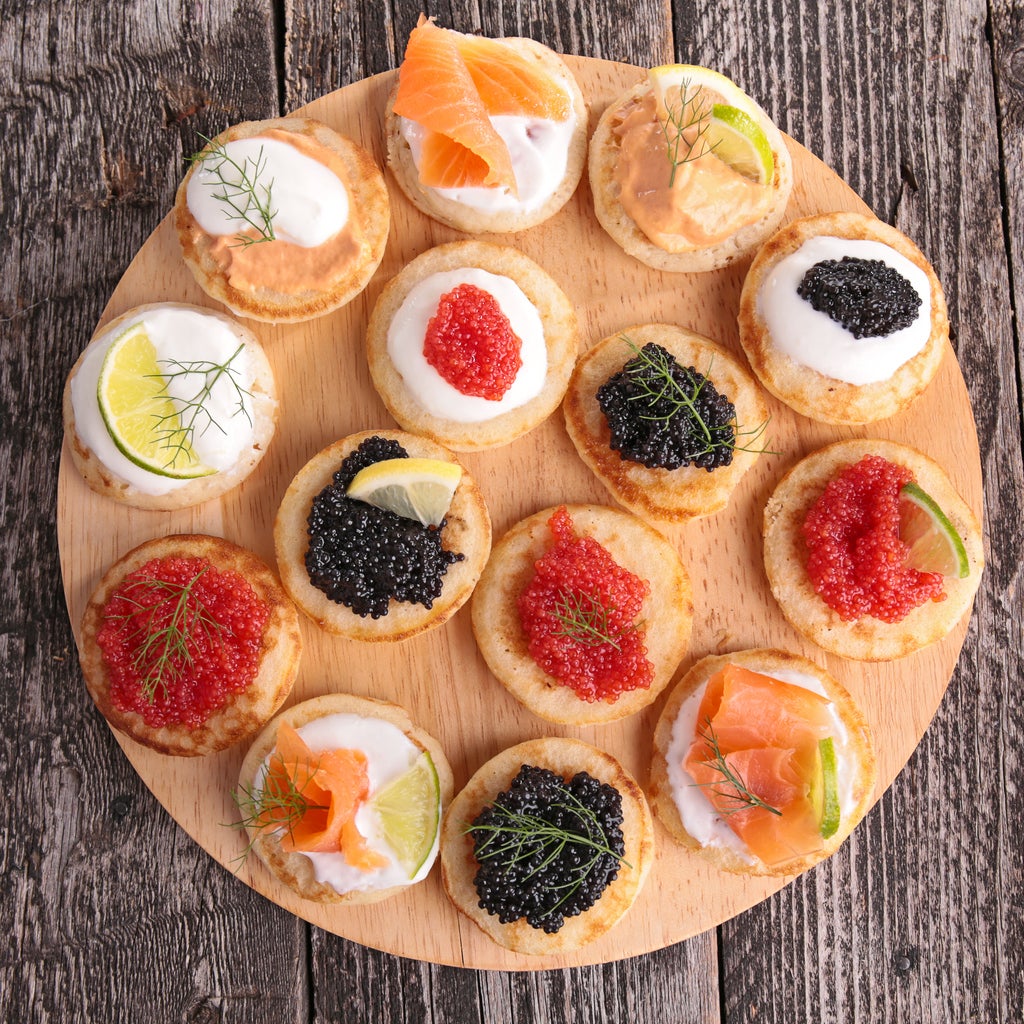
Richard Corrigan, chef and owner of Corrigan’s, Bentley’s and The Portrait
“To make blinis, place flour in a bowl with salt and nutmeg. Stir in eggs and egg yolks then whisk in milk until smooth. The secret to a light and fluffy blini is to ensure your mashed potato is free from lumps. Taking the extra time to thoroughly mash the potato – perhaps a little longer than you’d expect – makes a significant difference to the end result. Warm your potato through and fold into your mixture. Stir through cream cheese, cover and leave to rest. Cook in a non-stick pan until golden on the bottom, flip and repeat. Serve with a generous portion of smoked salmon, a squeeze on lemon and a dollop of crème fraiche. For an extra touch of luxury, finish with a little caviar… it is Christmas after all!”
Turkey
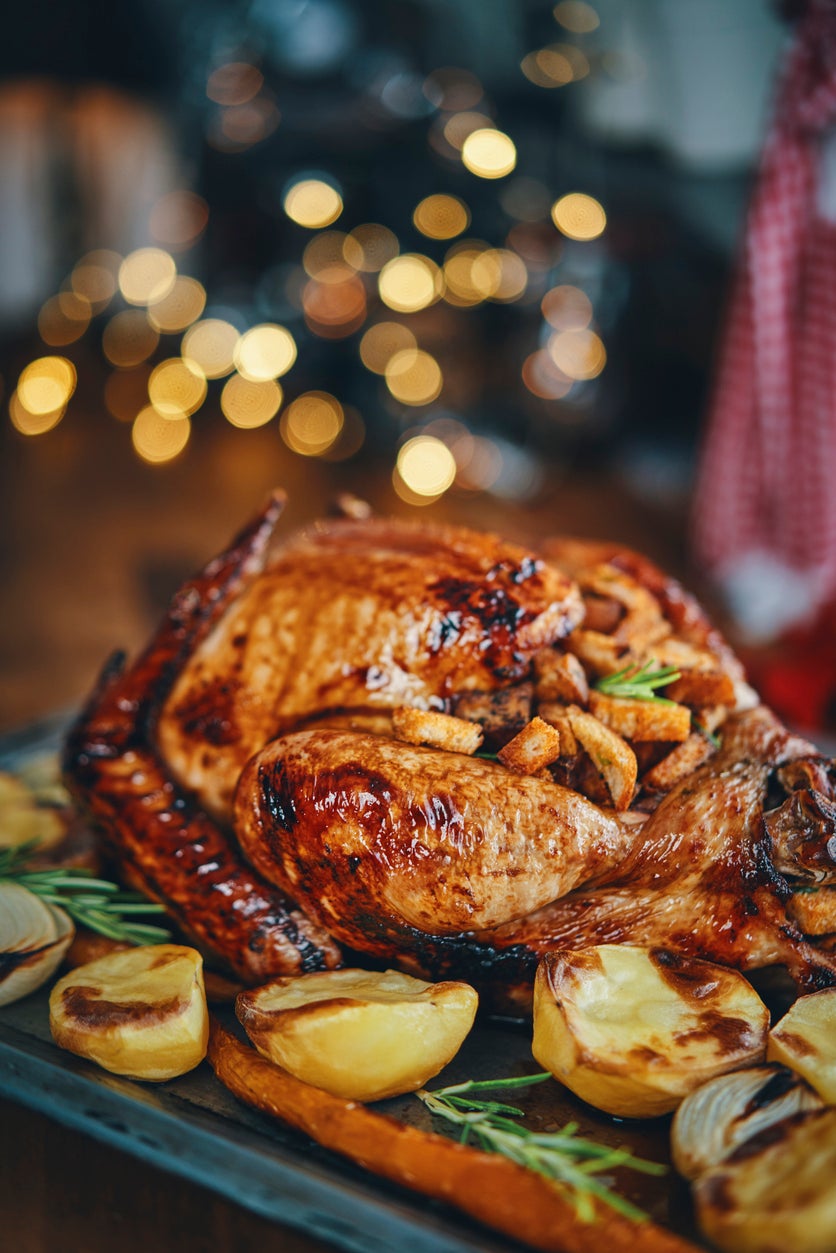
Kerth Gumbs, head chef at Fenchurch, London
“As well as brining your turkey to avoid it being bland and dry, I also like to prepare a butter and spice rub (it can be any spice you like) to help the meat stay moist, tender and fragrant, with a nice crispy skin. Keep the butter cold and roll it out with a rolling pin then run your fingers under the skin of the turkey breast creating a gap to spread the butter mixture directly on the flesh of the bird.”
Paul Ainsworth, chef and owner of Paul Ainsworth at No 6, The Mariners and Cafe Rojano
To make the most of your turkey meat, Ainsworth always recommends “brining your turkey in a 10 per cent salt water brine at least a day or two before and allowing the bird to dry in the fridge”. When it comes to cooking the turkey, Ainsworth recommends separating the legs from the crown and cooking at different temperatures. “Because the legs of the turkey are generally quite large, cooking them separate from the crown at a lower temperature (120C]) for a longer period of time will keep them moist and allow you to focus on cooking the crown/breast at a hotter temperature and a shorter amount of time. This will also help to keep the breast meat moist.”
For additional flavour Ainsworth likes to “make a stuffing with butter, lemon zest, thyme, garlic and brioche breadcrumbs and stuffing this mixture under the skin over the breast. Next, bake the crown wrapped in tin foil and increase the oven temperature, then remove the tin foil and cook for a further 10-15 minutes. This will achieve the best golden crispy skin with the addition of a moist breast filled with a beautiful stuffing.”
Tommy Banks, chef and owner of The Black Swan, Roots and The Abbey Inn, York
“I sometimes find that turkey can be quite bland! My top tip is to add a little Marmite and Lea and Perrins sauce to your turkey gravy for added umami flavour; this combo really packs a punch and is a great addition to Christmas dinner.” Likewise, Banks recommends doing the same when making homemade gravy, incorporating Worcestershire sauce and Marmite serves as a flavourful addition.
Jun Tanaka, chef patron of The Ninth, London
“Remove the legs of the turkey and cook them separately from the crown. This will shorten the time needed to cook the turkey and ensure that the breast is not overcooked or dry. So, for a 2kg turkey, you can roast the legs and the crown efficiently in the oven for around 1.5 hours, though the legs might need a little longer. To impress your guests further, stuff the turkey crown under the skin with a butter flavoured with thyme, lemon, sage, rosemary and parsley, then cut the skin on the turkey leg a few times and insert some thyme and rosemary, leaving you with a flavourful and tender meat.”
Maura Baxter, executive chef of 65a, London
”Brining the turkey tenderises what can be quite tough meat by breaking down the protein in the bird’s muscles. It also imparts great depth of flavour, and allows the meat to stay as moist as possible through the long cooking process.
For one turkey, I use:
5 litres water
500g salt
100g caster sugar
5 bay leaves
2 whole oranges, sliced
200ml orange juice
4 Barry’s Irish tea bags
A handful of pink and black peppercorns
Bring the mixture to the boil, then rest until cool. Soak the cleaned turkey for 12 hours prior to cooking, and once the turkey is cooked, rest it breast side down for 40 minutes to let the juices run back into the meat.”
James Knappett, chef-patron of Kitchen Table, London
“I prefer to make a ballotine out of turkey leg rather than breast, because it can take a longer cooking time while still remaining moist. Once the ballotine is assembled, I like to wrap it in cling film then tin foil before gently poaching. As soon as it’s ready, I rest it before pan frying – that way you can caramelise the skin while keeping the meat nice and moist.”
Andrew Clarke, chef founder of Acme Fire Cult, London
“Let’s be very clear: I don’t like turkey and I don’t condone it for the festive season, or any time for that matter. There are far better meats that could grace the Christmas table, but if you really must, brine it and cook it on the barbecue.
“Rub the turkey crown with a seasoned herby-citrus-garlic butter, getting plenty under the skin. You can also spatchcock it, for quicker cooking, Use a bbq smoker with indirect heat, rather than a grill, for a nice slow, even cook. I like to use a mixture of charcoal and wood, or just wood. Using some of the butter or marinade reserved from before, baste the meat throughout the cook, aiming for 71-72C when you put the thermometer in the thickest part of the breast for a moist, ‘just-cooked’ flesh.
“It is of utmost importance to rest the meat well before carving. Aim for ⅓ of the cooking time resting. The legs do have some flavour and slow cook well. I would cut the drums from the thigh, then marinade them with brown butter, oil, honey, garlic, thyme and citrus peel. Put them in a cast iron pot, with the marinade and seasoning, then cook slowly for a couple of hours until tender (82C). Wrap in greaseproof and foil to rest. These can also be done the day before and reheat well.”
Trimmings
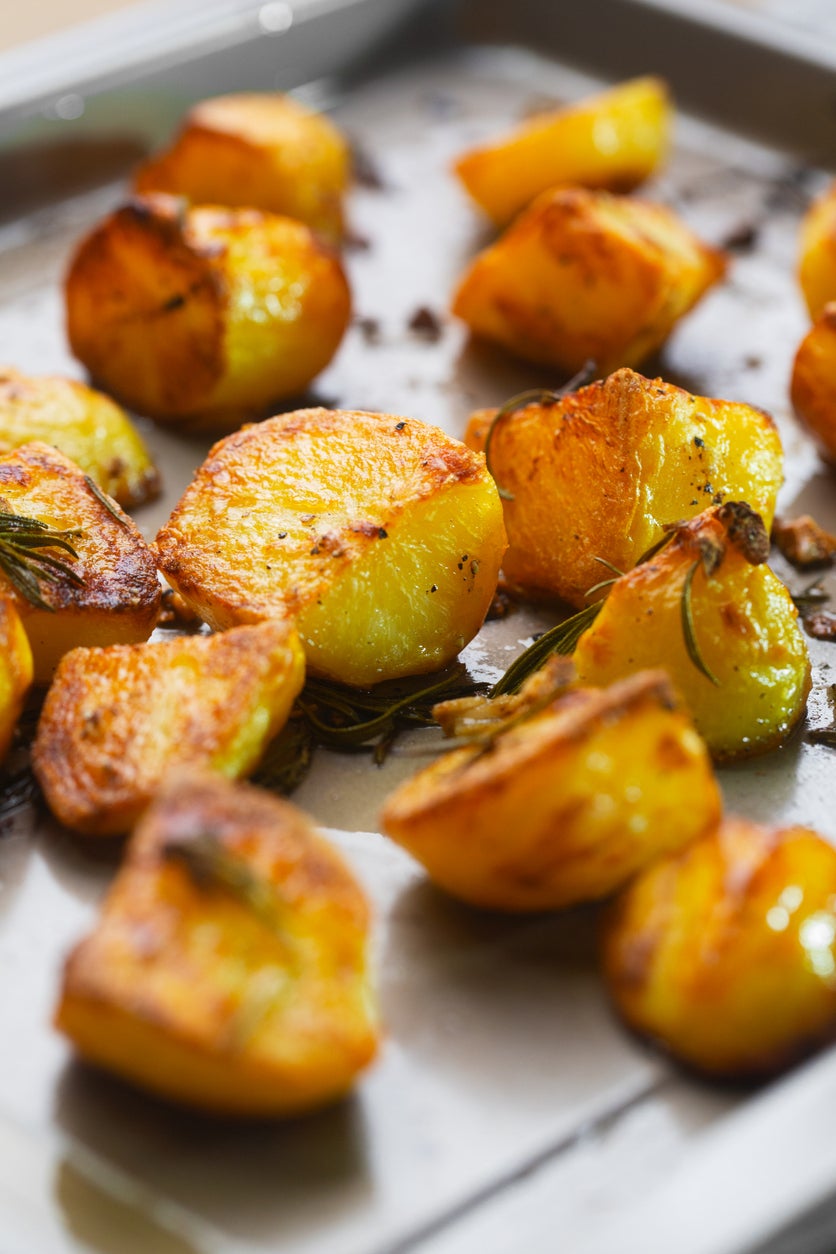
Alessandro Negro, executive chef at 30 Euston Square, London
“To make roast potatoes irresistible, melt a large chunk of smoked pork fat in olive oil and roast your potatoes in it – you’ll get an extremely crispy outside with a smoked flavour. For vegetarians, bring the olive oil to 70C and add lots of thyme, rosemary and garlic. Leave for a couple of hours to infuse before roasting your potatoes.”
Liam Walsh, executive chef at Smiths of Smithfield, London
“Jazz up your sprouts with an interesting butter. Parboil, cut in half lengthways and fry flat side down on a medium heat. Then, when nicely caramelised, finish with ’nduja and lemon butter, or my personal favourite, Marmite butter with freshly chopped parsley.”
Gregory Marchand, chef and owner of Frenchie, London
“Christmas cooking, like any good cooking, is a dance between tradition and innovation. It’s important to honour the classics whilst also trying new things! My signature bacon scones, for example, are a year-round favourite at Frenchie, but they also make an excellent alternative to pigs in blankets at Christmas. They’re sweet and savoury, light yet rich and indulgent. They make a great canapé or a tempting snack whilst the turkey rests.”
Ayo Adeyemi, executive chef at Akoko, London
“Adding just a sprinkling of smoked sea salt to your brandy sauce base has the most transformative result. The salt brings it back from the edge of being too sickly, and the background smokiness feels really grown up and a bit special. Either make your own batch from scratch or add to a shop-bought sauce, and then pour it over everything from Christmas pudding to ice cream.”
Jack Stein, chef director at Rick Stein Restaurants, Cornwall and beyond
“Take your gravy to the next level. Once you’ve made your gravy base by mixing roasting juices, flour, butter etc in a pan, add a dash of acidity, sweetness and umami for a nicely balanced flavour. For acidity, add cider vinegar or lemon juice; for sweetness, mirin, honey or sugar. Finish with an umami-rich ingredient such as Marmite, soy or Worcestershire sauce – taste as you go to ensure you have the right balance.”
Francesco Mannino, executive pastry chef at Pan Pacific London
“One of my favourite tips when preparing Christmas dinner is to add a teaspoon of cocoa powder to your gravy. It adds a richness to the sauce and makes it taste so much better.”
Drinks

Sandia Chang, co-founder and sommelier at Kitchen Table
Champagnes to drink on Christmas Day
“There are three bottles of Champagne that I think are perfect for drinking throughout Christmas Day – all of which champion small, independent producers:
- JL Vergnon Eloquence: perfect for present-opening sessions by the tree on Christmas morning. A Blanc de Blanc from the most famous Grand Cru Village of Les Mesnil sur Oger, this label makes for fresh, bright and easy drinking to start the day just right.
- Dhondt-Grellet Dans un Premier Temps: it has wonderful, slight richness that works really well with a variety of dishes, so this is a great one to serve with Christmas lunch. From one of the rising superstars of Champagne, Adrien Dhondt, this particular cuvee uses 30 per cent of reserved Champagne from a solera his parents started in 1985, creating a unique balance of freshness and maturity.
- Francoise Bedel Dis Vin Secret: whose tasting notes of toasted chestnuts and spiced crumble pair are the perfect accompaniment to a late-night cheese plate, rounding off the day.”
Alternative Christmas dinners
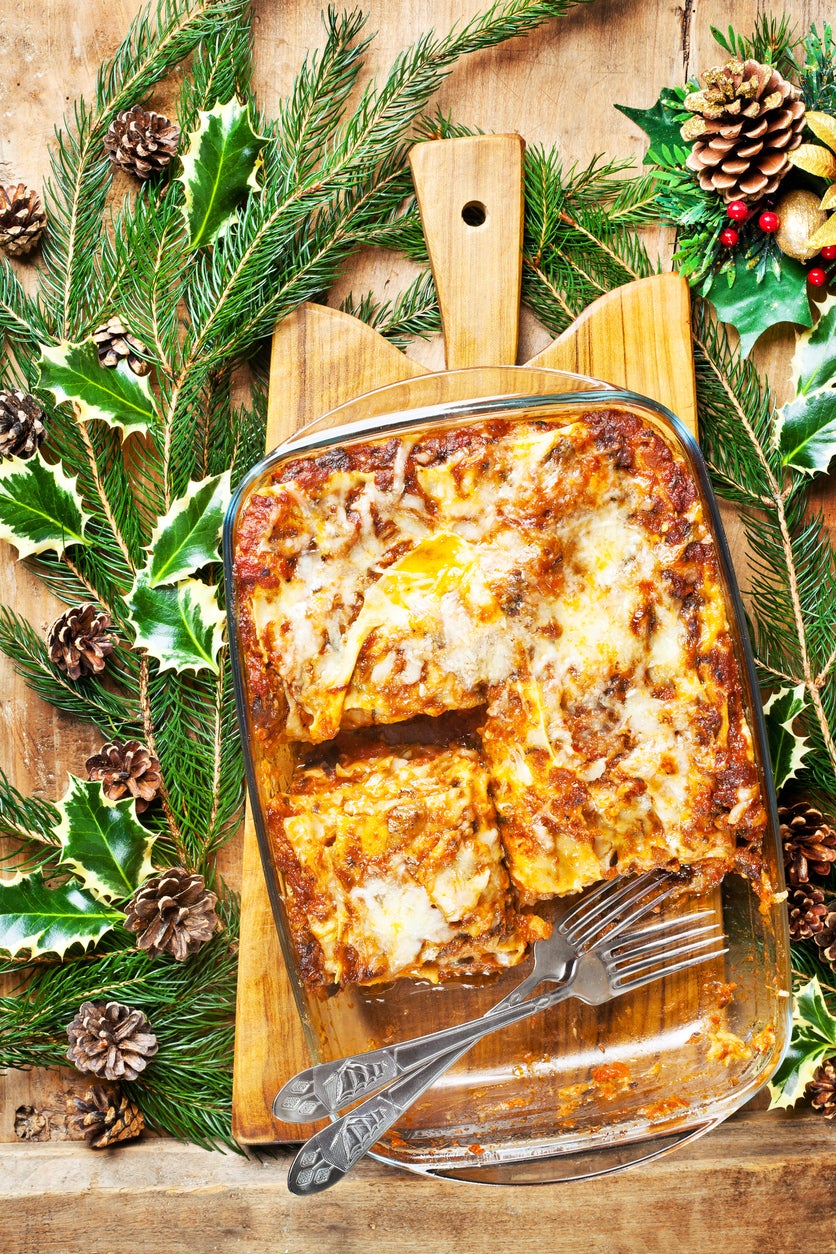
Theo Randall, chef patron at Theo Randall at the Intercontinental, London
“Try an Italian approach! Switch the turkey for dishes such as a baked pasta dish like a lasagna for a starter, and a classic Bollito Misto of poached chicken, beef brisket, cotechino and tongue with poached vegetables, salsa verde, horseradish and lentils for the main. Plus, the broth from the chicken can be used the next day to make a soup or for a risotto. For dessert, make a panettone bread pudding.”
James Knappett, chef-patron of Kitchen Table
“I always prefer to buy the haunch of the venison. People go for the loin, which is more expensive – but you can take individual cuts from the haunch which end up being much softer and moist when cooked. So my tip would be to pick a haunch over loin for a cheaper alternative, which will give just as good, if not better results.”
Maura Baxter, executive chef of 65a, London
“Potluck-style Christmas dinners take the pressure off the host and can be lots of fun. Each guest gets to play to their strengths, bringing their speciality, and it leaves ample time for prep in their own kitchens. It’s also a lovely feeling with everyone contributing to the feast. I’d bring something in season, that’s sure to compliment the main dish.”
Leftovers
Oliver Marlowe, owner and chef director at The Apollo Arms, Ganymede, The Hunter’s Moon, London
“Leftover Christmas pudding calls for tiramisu! Substitute classic ladyfingers for leftover pudding, layer it with your mascarpone cream, then repeat until the dish is full, finishing with a sprinkle of cocoa powder, shaved chocolate and clementine zest – rest for three hours before serving!”
Vivek Singh, executive chef at The Cinnamon Collection, London
“With your leftovers separate them by categories (proteins, sauces, condiments, veggies, dairy) and make a food calendar/eating schedule to eliminate waste. Ideas include a goose/turkey toastie with blue cheese and cranberries, a stir fry or loaded omelette.”
Robert Pearce, executive chef at Down Hall Hotel, Essex
“I love having leftovers for breakfast on Boxing Day – I combine Brussels, pigs in blankets (if there’s any left!) and roasties by chopping all in a bowl and shaping them into patties. I then shallow fry, ensuring colour on both sides, for the ultimate festive hash browns!”
Tommy Banks, chef and owner of The Black Swan, Roots and The Abbey Inn, York
Banks likes to be resourceful with his leftover Christmas dinner ingredients. “Use your leftover turkey for a curry on Boxing Day.” Take a classic butter chicken recipe and supplement the chicken for turkey meat. “You can’t go wrong,” says Banks. Likewise, turn any leftover cheese on the cheeseboard “to make Welsh rarebit for brunch on Boxing Day”.
Ana Gonçalves and Zijun Meng, founders of Solis, London
“Often, after our Christmas dinner, leftover chicken or beef jus takes on a new life as a broth by adding water and seasonings like black pepper, soy sauce, rice vinegar, miso and sesame oil. Add wheat noodles and thinly sliced beef for a comforting bowl, garnished with fragrant herbs like coriander. If we have lots of roasted veg leftovers, we also like to make a tortilla. Just replace the traditional layers of potatoes with roasted parsnips, carrots and brussels sprouts.
“After many years of living in the UK, this will be our first Christmas in London. We are really looking forward to gathering together, slowing down, cooking and eating. Our Christmas day menu is still a work-in-progress but one thing we’re certain on is that the Solis cheesecake will be on the table.”
Will Murray, head chef and co-founder of Fallow, London
A new and noteworthy festive menu offering at Fallow this season is the Wildfarmed sourdough bread made from fermented potato and served with Netherend butter. Head chefs and co-founders Will Murray and Jack Croft will be using leftover roast potatoes to recreate the dish at home this Christmas. Murray talks us through the process: “start by blitzing your roast potatoes in a blender with 3.3 per cent salt and leave to ferment in a container outside the fridge with a layer of greaseproof paper covering the top. After five days, take your fermented potatoes and combine Wildfarmed flour, the most sustainable flour you can buy, and acorn flour which adds a delicious nutty flavour. Add your sourdough starter and a little fresh yeast and treat as you would a typical sourdough bread dough. Bake in the oven at 160C for 18 minutes with a little humidity.”
John Javier of The Tent (at the End of the Universe), London
“I always like to have some jus ready for those Christmas season roasts. I like my jus really clean and light in flavour, so I just simmer around 4kg of chicken wings in water for 6 hours, with no mirepoix. In the last hour, I’ll throw in about a kilogram of roasted wings, then strain, skim and reduce to jus consistency.”



Join our commenting forum
Join thought-provoking conversations, follow other Independent readers and see their replies
Comments